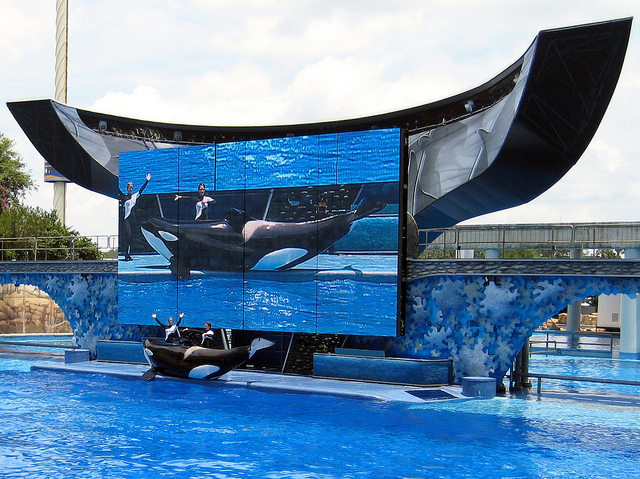
“You can judge a man’s true character by the way he treats his fellow animals.” ~Sir Paul McCartney
Sea World recently reported that they saw their profits plunge 84% since the 2013 movie Blackfish claimed they mistreated their Orca whales.
When I read this headline, it was the best news I have heard in a long time.
This isn’t just a story to me, but rather an issue that is incredibly close to my heart as one of my life’s missions.
Prior to graduating from college, I was a Marine Biology major. I spent an entire summer sailing around the Gulf of Maine with Cornell University and the Woods Hole Oceanographic Institute conducting research experiments and observing ocean life in their natural habitat.
Although my career path has since gone in a different direction, the time that I spent during this summer has stayed with me—as has my love for the ocean and the passion that I feel for ethical fishing practices and humane marine educational experiences.
It seems that so many of us have a deep love for the ocean and for animals—but somewhere along the way we became confused as to how best to honor that connection.
To love an animal is not to hunt it, or to go and observe it in an enclosure after it has been abducted from its family—which is exactly what happens.
While SeaWorld doesn’t like to expose or promote the negative aspects of keeping these magnificent creatures in captivity, there are some harsh truths hiding behind their popular Orca shows.
The movie Blackfish was released in 2013 and discusses the allegations of abuse occurring at Sea World as well as the death of one of its trainers. The movie documents the life of the bull Orca whale Tilikum—the same whale who killed Dawn Brancheau, his trainer, in February of 2010.
Tilikum is a five ton male Orca whale that currently lives at Sea World Orlando. Originally born in 1981, he has sired 21 calves (11 of which are still alive). He has also been involved in the deaths of three people during his time in aquariums. Tilikum was featured heavily in the CNN film Blackfish as a major reason why Orcas are not meant to be live in captivity.
To this day, Sea World disputes any claims made against them regarding the health and treatment of their whales.
Despite extensive marine biology research that claims Orca whales can live as long as humans, Sea World still maintains that their average Orca lifespan of 20-30 years is normal—and even better—than life expectancy in the wild.
By 2015, it seems that the public has finally stopped buying their story.
I am ashamed to say that I myself have been to Sea World.
It was during a time when I had lost touch with my values and who I was as a person. I took my oldest daughter to see the Orca show. Rather than cheering as the rest of the crowd did, I quietly looked on as silent tears fell from my eyes.
This was not a show—this was abduction of intelligent animals from their pods and subsequent performance slavery for entertainment.
I began to think about the difference between these whales and children that are kidnapped from home and sold around the world. Does it make any difference that these SeaWorld captives are whales and not humans?
Anyone that has spent time out on an environmentally safe whale watching trip (not all such trips are created equal) will surely witness the connection of the animals as they travel in pods—the way nature intended them to.
Whales are mammals—just like us. They give birth to live young and they produce milk to sustain their offspring. When there is danger around, the whales circle around the youngest to protect them. When one is sick or in labor, other whales support their weight near the surface so that they can continue to breathe.
Yet, some humans still feel that these magnificent creatures are nothing more than a way to make money.
Sea World has recently launched a 10 million dollar publicity campaign with the intention of showcasing veterinarians caring for their whales in hopes of changing public opinion. I am sincerely hoping that this campaign doesn’t fool anyone.
We have decades of research to show that not only are Orcas not as healthy in captivity, despite any veterinary care—but they also just simply are not meant to be caged.
To pay money to go see an animal in a tank is not a way to truly observe that animal, especially when they are made to do tricks and cultivate behaviors that they wouldn’t naturally exhibit in the wild.
I hope others join me in boycotting Sea World and will help me in taking a stand to initiate the change that these creatures so desperately need.
~
Blackfish Trailer:
~
Sources:
~
Relephant Read:
The Stories we Tell: Why we Mourn the Death of a Lion but Bond over Burgers.
~
Author: Kate Rose
Editor: Alli Sarazen
Photo: Robert L./Flickr






Read 1 comment and reply